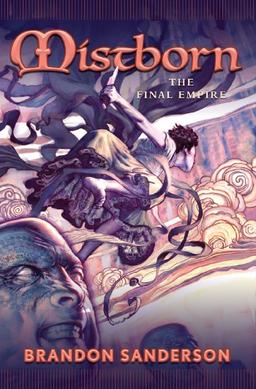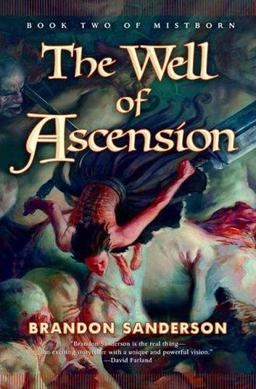In my life, I haven't been known for reading works of fiction very often, nor of particularly enjoying them when I do. However, there are key exceptions, like semi-physics-based sci-fi/fantasy novels that address realistic human concerns. In recent years, I've read both the Harry Potter septology and Ender's Game and enjoyed both of them very much.
This June, I asked my lovely, awesome friend Bridget what her book recommendations would be for me this summer. Her and I have similar interests in books, but she reads more than I do, so I can always count on her for a good recommendation. She said that I absolutely had to read the Mistborn Trilogy, by Brandon Sanderson and that it had replaced Ender's Game as her favorite book in the history of books. Naturally, I went down to the bookstore and picked up the entire trilogy in a paperback box set.
They were awesome.
The remainder of this post will be dedicated to my thoughts on each book in the series without giving away too much. If you haven't read this series, go out and get it right now, because it's just that good. I'll try my best to avoid the worst spoilers, but in order to adequately describe my thoughts on these books, I have to give a few things away.
Mistborn: The Final Empire
Sanderson describes this story as a fantasy/heist story/kung fu epic, and I think that's a pretty good description. The story is about a young, orphaned street urchin named Vin who gets recruited by a specialized thieving crew to try to pull off an almost impossible task in assassinating their world's emperor god. Vin is pulled into this thieving crew because she possesses a rare form of magic called Allomancy, which allows the user to harness power from metals they ingest. Because she possesses all of the powers, as opposed to just one of them, she is called a Mistborn, the namesake of the series.
Throughout this book and its two sequels, I was really impressed with Sanderson's efficiency in telling a story with only a few words. Though this book is fairly long, it packs a large quantity of plot and character development into each of its pages. There are almost no wasted words and at no point in this novel did I question the author's decisions in placing words, sentences, or section where they were. This novel and this series were very well done and I can appreciate basically everything that Sanderson chose to do throughout.
Having finished the series, I can really appreciate the contrast that Sanderson gives with symbols and character development. A large portion of this story is given to Vin's development as she changes from an abused, paranoid shell of a person into the confident, trusting young woman she becomes. I particularly appreciated her internal monologs in which she states that the 'real' her is neither the street urchin that she was, nor the young country noblewoman she was pretending to be, but something in between. I found that particular contrast to be impressive.
My favorite character throughout this novel and throughout this series was Sazed, the Terrisman. He is first introduced in chapter 8 (I believe) of Mistborn and remains an important character throughout the series. Almost immediately, he is shaped as a tall, but gentle scholar who seeks to fulfill his role in life, but also seeks to effect change however he can while living that role. Needless to say, I felt an immediate connection and followed him closely as I read each book.
The resolution to this book is unexpected. Unless you're somehow clairvoyant or have already read or heard a spoiler, you won't see the end to this book coming. It was probably even more so for me. For good or ill, I often like to read the last sentence of a book before I even start just to give me a feel for how the book with end. Sometimes this reveals epic spoilers, but more often, it just gives me a general idea of the feelings the author is trying to convey by the ending of the book. (I read the end of chapter 38, not the epilogue.) In this case, it was something of a spoiler, but not unforeseen, given the context of the book. However, I managed to misread the pronoun in the last sentence replacing a 'he' for the 'she' that was actually there. This lead me to believe that Kelsier took up Vin's role at the end of the book. As the resolution unfolded, my mind blew apart, leaving little chunks of brain all over my apartment. It was that good and made even better by my initial misread of the final sentence.
The Well of Ascension
This book is a continuation of the story from the first Mistborn book. Vin, Elend, and much of Kelsier's crew try to establish a government in place of the Lord Ruler's regime and face many challenges to their authority and legitimacy. Additionally, Vin has to struggle through her feelings of love and affection for Elend and another man who she believes might understand her better. And they do, eventually, find the Well of Ascension.
Of the three books in this trilogy, this one was my least favorite as a stand-alone novel. It proved to be an excellent bridge between the premier, Mistborn, and the finale, The Hero of Ages, but I didn't particularly enjoy it, in and of itself. Of the three books, this one is the longest (just slightly) and contains the least change from beginning to end in setting, scope, and plot. At the end of the story, the characters are basically in the same place they were left at the end of Mistborn, except with one big, new problem on their hands. I thought the parts of establishing and re-establishing the government of the land and Vin's love triangle, particularly, took too long and could have used to be more concise. Brandon Sanderson was still good at fitting a lot of plot and character development into a few pages, but I thought he could have done better with those two particular parts.
This story is not as much about the plot itself as it is about the character development. This is another problem with this book as a stand-alone novel: it serves as a great prelude to the Hero of Ages with some excellent character development that sets up that story very well, but doesn't accomplish that much in its own plot. I generally appreciated the character development of Vin, Elend, Breeze, and Spook, but I cannot say the same for the development of my favorite character. In this book, Sazed is given a brief taste of that one thing he's wanted all his life, then has it ripped away from him, leaving him a sad, empty shell of a man, doubting even his most firm internal convictions. Objectively speaking, the character development is probably good, it just hit way too close to home for me to really appreciate it.
In the end, Vin, Elend, and Sazed do find the Well of Ascension, and we're left with something of a cliffhanger as to what will happen to the main characters and the world in which they live. Again, this gives great setup for the epic finale, but does not lead to a great resolution for the novel itself.
The Hero of Ages
Instead of the main plot conflict coming from physical armies, it is derived more from intangible powers. There is still plenty of physical confrontation, as this is a theme of all three books, but the primary conflict comes mostly from outside, metaphysical powers. Just when everything seems hopeless, the Hero of Ages is able to ascend and to make things right.
This is pretty much now my favorite book in the history of books. Everything that seemed to go wrong in The Well of Ascension was corrected in The Hero of Ages. It blew my mind all over the place, and I love it.
The theme of contrast that I appreciated in Mistborn was even more apparent in Hero of Ages in the contrast between Preservation and Ruin. The mists, which are of Preservation, are white, while the ash increasingly coming from the ashmounts, a tool of Ruin, are black. Additionally, I like that Sanderson made Vin a type of Ruin with her ability to destroy and to wreak havoc on her enemies and Elend a type of Preservation with his desire to maintain peace and order. This effect is magnified when one considers that Vin predominantly wears black and Elend wears his white suits given to him in the previous novel. That particular effect is easier to catch when you read the paperback version as opposed to the hardcover.

I also really like that Sanderson was able to convey a sense of absolute hopelessness through the pages toward the end of this novel. In most stories, one can tell that everything is going to be alright in the end and that the main characters will all be fine. Near the end of this novel, I couldn't help but wonder if everything was going to come crashing down and the resolution would be one that is unhappy, but fitting for the context. I love those kind of books, but I didn't really think this one was going to be one, thus I was supremely pleased with the resolution that Sanderson was able to create.
I also really liked the character development of Spook in this particular novel. Throughout the first two books, Spook is a mostly unimportant and forgettable character. However, in this one, he becomes one of the central characters, overcoming much of his forgettability to become integral to the plot and the well being of the other characters.
The Hero of Ages was just plain awesome.
Over the last couple months, I've really enjoyed reading these books. I've even read the Alloy of Law as well, but I think that'll be a blag post for another day. Though I don't often enjoy fiction, these books are of a genre and style that appeals to me as no other novels really have before. Brandon Sanderson is truly a remarkable author and is able to do things that most other creative writers are just not capable of. These books have captured a place as my favorites and will probably remain so for the foreseeable future.
PS - If you want to check out more of Sanderson's stuff, click
here.















